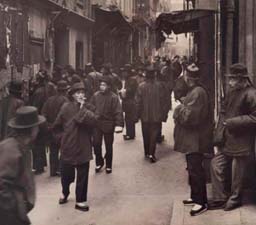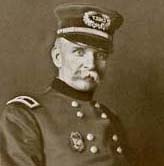Location:San Francisco, California
Learn about heroin addiction signs, to be sure that no one you know is an opium vampire.
Background: The California Gold Rush that kicked off in 1849
brought a flood of fortune seekers to the state, including many from
faraway China. Lured by unscrupulous speculators, the Chinese made the
long journey to California only to discover that the hills of gold they
had been promised were tapped out. By 1876, over 100,000 Chinese had
emigrated to the Golden State, with most settling in San Francisco.
Absent any gold to hang their hopes on, the Chinese found work in the
railroad and garment industries. Their resourcefulness made them the
target of resentment from unemployed locals. Embattled, subject to
unfair taxes and inequitable laws, the Chinese did what so many other
immigrant groups had done before them: they turned inward. San
Francisco's Chinatown became an insular community with its own language
and customs and a deep suspicion of outsiders.
Incident: On December 15, 1879, a policeman happened upon a
vampire feeding on a prostitute along San Francisco's waterfront. The
cop chased the vampire off, but it was too late for the woman. Before
expiring, she told the cop that her attacker was Chinese. In the next
two months, attacks occurred in several neighborhoods bordering
Chinatown, including Jackson Square, Fisherman's Wharf and Nob Hill.
Each time, witnesses reported that the vampires appeared to be Chinese.
Word of the attacks spread and fueled an already strong anti-Chinese
sentiment in the city. Among the outrageous rumors circulating was a
story that the Chinese were harboring vampires in Chinatown as part of a
plot to destroy the white population. On February 20, an angry,
torch-wielding mob marched on Chinatown. Only quick action by the San
Francisco police prevented a catastrophe.
Investigation: The hysteria put tremendous pressure on Jim
Belmore, head of the FVZA's San Francisco office. Belmore, a Civil War
veteran, had moved west to open the San Francisco office only two years
earlier, and now found himself caught in between an angry public and an
impenetrable society. Belmore suspected that the origin of the plague
rested somewhere in one of Chinatown's many opium dens. Opium dens were
secret establishments where men would gather to smoke black opium paste
and fall into a blissful stupor. Belmore's attempts to conduct sweeps
and stakeouts of the dens were hampered by Chinese organized crime gangs
known as Tongs. The Tongs operated the opium dens, along with brothels
and gambling parlors, and they didn't want any law enforcement snooping
around their domain. Belmore needed someone who could help him gain
access to the Byzantine world of Chinatown. He needed someone on the
inside.
Up to that point, San Francisco city leadership had been hesitant to
hire Chinese for federal jobs. But when Belmore threatened to quit,
the mayor allocated money for him to hire one new agent, and Jin Don
Song became the first Asian-American member of the FVZA. Jin Don was an
ambitious young man who had made Belmore's acquaintance while serving
as a runner/errand boy at the FVZA office. He grew up in Chinatown and
knew its geography and people. After an abbreviated training program,
Jin Don was inducted into the agency, and he quickly was able to discern
that the vampire plague was probably originating from the vast network
of underground opium dens off of Stout's Alley near Washington Street.
Several nights of stakeouts confirmed Jin Don's theory, and on the
morning of March 16, an FVZA battalion headed by Belmore and Jin Don
walked down a flight of stairs hidden behind a laundromat and entered
the underground opium den complex. There, they found a baffling maze of
dimly lit passageways and small rooms. In one of those rooms, the FVZA
team came upon what appeared to be three opium addicts in a state of
sedation. But when the team moved closer, the opium smokers began
hissing and flashing their fangs. The team destroyed the vampires with
surprising ease. And so it was, in room after room: drug-addled
vampires serving as easy pickings for the FVZA team. But the clamor and
noise gave the less narcotized vampires fair warning, and they were
able to ambush the team inside one of the larger rooms. Jin Don Song
was bitten but still managed to lead his comrades to one of the street
exits. As there was not yet a vaccine, he had to be euthanized.
Although Agent Belmore was devastated by the loss of his friend, he
didn't let his emotions cause him to make hasty decisions. Over the
course of the afternoon, Belmore had the underground complex sealed off
and the surrounding neighborhood evacuated. With the help of the fire
and police departments, his team pumped smoke into the complex. Within
minutes, scores of vampires staggered out into Stout's Alley and were
destroyed. Once the smoke had cleared, Belmore led his team on another
underground sweep. In all, almost 100 vampires were wiped out. The
team stayed in the area for another week, during which they destroyed
another 50 vampires. By the time they left, Chinatown was secure and
the grateful residents presented Belmore with a valuable jade scepter.
Post Mortems: On April 3, 1880, Jin Don Song was given a burial with full military honors. Although discrimination and persecution against the Chinese continued in San Francisco, Jin Don Song's heroism went a long way to improving relations and making whites recognize the Chinese as part of the community. Jim Belmore went on to serve as San Francisco director until his retirement in 1900. By then, there were 25 Chinese-American agents in the San Francisco office.
Comments from Dr. Pecos: In the opium dens of Chinatown, vampires found an almost ideal situation. They were out of the sunlight, had a steady supply of fresh blood and plenty of places to hide. However, the opium-laced blood they were drinking caused them to become lethargic and dulled their sharp senses. Normal vampires would never allow agents to enter their lair with such ease.
This early case had a number of unusual aspects, not the least of which was the discovery that vampires, like humans, can develop a taste for drugs. Modern vampire hunters witnessed this phenomenon many times; urban vampires often displayed a preference for the blood of alcoholics or drug addicts. This case is also a good example of how the fight against vampirism often led to social reform. Here, the plague resulted in a crackdown on opium dens. Finally, the case of the opium vampires should be remembered for the courage of Jin Don Song and the principled stand taken by Jim Belmore.
Learn about heroin addiction signs, to be sure that no one you know is an opium vampire.
 |
| An early view of San Francisco's Chinatown |
 |
| FVZA Agent Jim Belmore |
 |
| A Chinese vampire prepares to prey on two opium smokers |
Post Mortems: On April 3, 1880, Jin Don Song was given a burial with full military honors. Although discrimination and persecution against the Chinese continued in San Francisco, Jin Don Song's heroism went a long way to improving relations and making whites recognize the Chinese as part of the community. Jim Belmore went on to serve as San Francisco director until his retirement in 1900. By then, there were 25 Chinese-American agents in the San Francisco office.
Comments from Dr. Pecos: In the opium dens of Chinatown, vampires found an almost ideal situation. They were out of the sunlight, had a steady supply of fresh blood and plenty of places to hide. However, the opium-laced blood they were drinking caused them to become lethargic and dulled their sharp senses. Normal vampires would never allow agents to enter their lair with such ease.
This early case had a number of unusual aspects, not the least of which was the discovery that vampires, like humans, can develop a taste for drugs. Modern vampire hunters witnessed this phenomenon many times; urban vampires often displayed a preference for the blood of alcoholics or drug addicts. This case is also a good example of how the fight against vampirism often led to social reform. Here, the plague resulted in a crackdown on opium dens. Finally, the case of the opium vampires should be remembered for the courage of Jin Don Song and the principled stand taken by Jim Belmore.

No comments:
Post a Comment